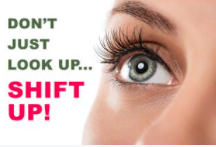Environment
Don’t Just Look Up, Shift Up
Here's the deeper lesson in this doomsday satire.
Posted January 4, 2022 Reviewed by Lybi Ma
Key points
- The film 'Don't Look Up' is a Rorschach test for political affiliations; reviewers see what they want to see in it.
- Climate change won't hit full force for a couple of decades, maybe we should look up at the comet that is hitting us now, Omicron.
In Adam McKay’s doomsday satire Don’t Look Up, Kate Dibiasky (Jennifer Lawrence), an astronomy grad student, makes an astounding discovery of a comet that is on a direct collision course with Earth with 99 percent certainty. Supported by her professor, Dr. Randall Mindy (Leonardo DiCaprio), they accept the challenge of warning mankind about a planet-killer the size of Mount Everest as an inconvenient truth. They embark on a media tour that takes them from the office of an indifferent President Orlean (Meryl Streep), who was formerly a reality TV star, and her sycophantic son and Chief of Staff, Jason (Jonah Hill, who really is quite funny), to the airwaves of The Daily Rip, an upbeat morning show hosted by Brie Evantee (Cate Blanchett), an effervescent TV host who is more concerned with ratings than just about anything.

Ideological divide
Obviously, this is a film about climate change, and the critics fall into ideological camps. The liberals say: “Don’t Look Up might be the funniest movie of 2021.” “A damn near-perfect film. Funny in a witty, sometimes dark, intelligent way, like an Idiocracy for 2021.” And the conservatives inevitably pan the film:“It’s a failure on too many levels and, although the viewing numbers may satisfy Netflix, it’s a shock to see such a high-profile film self-destruct.” “All bite but no teeth, you could say. Still, as an intermittently amusing lark to stream on your 60-inch, it passes muster as OK time-killing fodder.”
The film seems to be a Rorschach test for political affiliations; reviewers see what they want to see in it. However, there may be a more urgent moral to the story. Climate change is a comet that isn’t going to hit us at full force for decades. Maybe we should look up at the comet that is hitting us now: The Omicron variant. Across America’s political chasm, liberals are making booster shots and test kits as hard to find as toilet paper when the pandemic began, while the conservatives pooh-pooh the pandemic, claiming, “It’s just the flu,” and doubling-down on anti-vaxxing and anti-masking.
It’s equally obvious that this film can’t possibly make enough of a dent in how people choose or refuse to see reality clearly, but it can lead us to the following realization: It’s not just enough to look up, we need to shift up.
Lessons from paleobiology
The pandemic is actually a valuable learning experience for humanity to develop new forms of emergent self-organization—all part of what I call the process of societal coadunation. Coadunation is the biological term for the transition of single-cell organisms into multi-cellular life, which launched the Cambrian explosion over 3.5 billion years ago. This was the most pivotal moment in the history of microbiology on Earth, and it is based on the reality that cooperation is advantageous, as cells benefited more from working together than they would from living alone.
One of the most interesting finds from the fossil record of biological coadunation is how eyes evolved during the Cambrian explosion. Fossil evidence suggests that sophisticated sensing evolved during the Triassic and Jurassic periods. Before this point, organisms were either filter feeders or microbial mat grazers, happily feeding on whatever was available. These organisms developed sensory adaptations for two obvious reasons: nutrient scarcity and predation.
These adaptations made it possible for organisms to act as hunters or scavengers, to go to where the food is, or to get away from becoming food. Arthropods took the lead in the evolution of vision and domination in Cambrian communities, which supports the hypothesis that the origin and evolution of vision was a key trait that promoted diversification and formed the foundation of ecological communities in the early Cambrian ocean. Also, with sensation came nervous systems. Fossils suggest that animals evolved complex nervous systems after the advent of predation to hunt better and to better avoid being hunted.
This provides us with a vital lesson for the evolution of societal coadunation, the key functionality that society must develop is the ability to see reality together.
During the Cambrian explosion, a sensory adaptation that sends you exactly in the opposite direction of richer nutrients and right into the jaws of a predator that mutation wouldn’t last very long in the Cambrian sea. Similarly, a society that perverts the media so its viewers are sent in the opposite direction of survival will not last long either. Political leaders who push their constituents away from life-saving vaccines and toward 20x more deaths are essentially sending their followers into the jaws of a viral predator.
Where we’re heading
The force of evolution always propels toward the refinement of sensory function. If you want to shift up to the next level of societal evolution, then you have to transcend things like believing the Earth is flat, that professional wrestling is real, that Bill Gates is putting nanobots into the vaccine to track you. This pandemic that has killed over 5 million people teaches us that danger today isn’t necessarily between countries. Just as predators forced microorganisms to develop better sensory function and eventually awareness and memory, it may be that COVID is an opportunity for humanity to shift up and learn how to see reality more clearly together. In fact, it may be that for a society to learn how to overcome a conspiracy theory is, in itself, a mechanism that drives societal coadunation.
We need to ask ourselves: Am I seeing reality as it is, or as I want it to be? Should I believe the CDC or my favorite talk show host on TV? Does listening to him really increase my chances of dying by 2,000 percent? Should I ask my doctor what is real and what is poppycock?
Even though Don’t Look Up satirizes our climate inaction, we must remember that the human species is threatened with extinction on multiple fronts: climate change, renewed tension among nuclear powers, the possibility of malevolent artificial intelligence, super-volcanoes of the sort lurking beneath Yellowstone, pandemics for which COVID may be a mere dress rehearsal, and, of course, comets. And to address these threats, the human race really needs to look up, level up, and shift up.
As entertainment, we should agree on the reality that this film is funnier than anything, but at the same time, see it as a desperate plea for change. Let’s hear that plea. Together.




